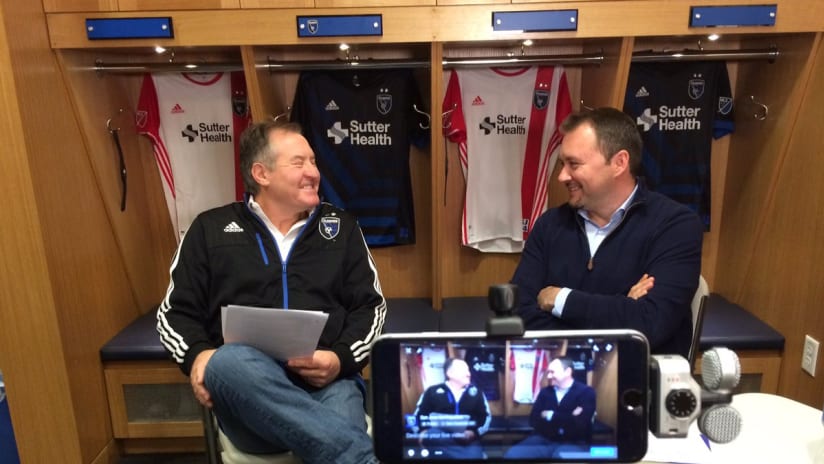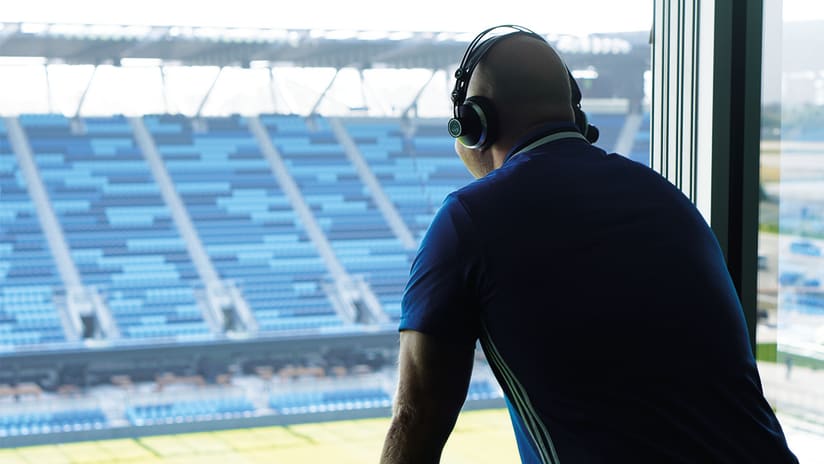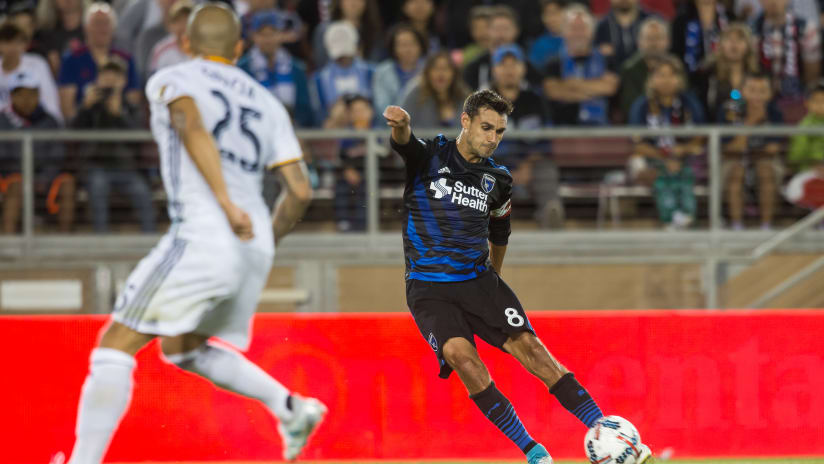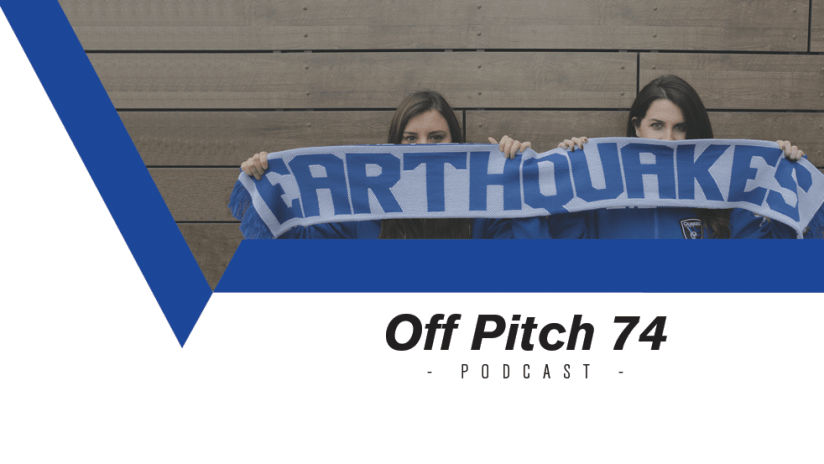Chris Dangerfield:
Hey Quakes fans, Chris Dangerfield here joining you on Facebook Live. Today I’m joined by Quakes general manager Jesse Fioranelli for a Question & Answer with you, the fans, about Jesse’s first—and very successful—100 days in office. Jesse, how are you doing today?
Jesse Fioranelli:
Excited. Excited to be here. Hi, Quakes fans. Let’s get this started.
D:
So, today actually does mark your 100th day since you arrived in San Jose. What have you learned about this great soccer community so far?
F:
I really appreciated getting to know a vibrant city, a diverse city, people of all backgrounds, progressive-thinking people. I think this is really what is important, what is key about San Jose. I realized that, having had the opportunity of going to the history museum in San Jose, that there is a lot to fall back on as to the heritage of the club and what people really care about. It’s been a fantastic first hundred days.
D:
Now, you speak several languages and I know for a fact that in the diverse community here in San Jose, we have fans from all over the world attending the game. Have you managed, in the community, to use most of those languages so far?
F:
It was really exciting. In Italy, you usually speak only in Italian and coming over here to America, to San Jose, I actually got to reach out to the Latin American community. That’s also a community that we’d like to reach out to more in the future and also markets that we would like to pursue as a club, whether that’s on the talent market, just even scouting and seeing which developments the game actually takes, so I’m really excited to reach out to our fans from this diverse background.
D:
I’m sure the fans want a star player from their specific country or community, but it’s difficult to keep everybody happy, that’s for sure. Now, when you arrived, MLS is a difficult league to get involved with. There’s a lot of different things you have to learn as a general manager—the way the league is structured, salary caps, everything that goes into making such an interesting league in a lot of ways—but what did you want to accomplish the most in your first few months here and how do you think it’s gone so far?
F:
The first hundred days, I really wanted to come in not wanting to restructure the club, but really to listen well in order to be more effective. I have had now, over the last three months, over 160 meetings with the key stakeholders—I call them “captains”—of their respective areas, whether that is youth development, whether that is the first team with the coach, the performance coaches, the players, the young players, and really trying to understand what the stomach aches are on the one hand, and on the other hand, also, the opportunities that lie ahead. I really wanted to do that. I also cared about identifying ways on how we can create a method—a method on how we scout, a way on how we develop players, how we analyze, and especially how we actually bring our thoughts across when it comes to, you know, planning, video analysis, etcetera etcetera. That is a big part that has shaped me in the past and [that] I wanted to propose also to the various people I’ve been working with and talking to.
D:
Yes, it seems the club is starting to get a structure and it’s going to be structured in a way as being a bigger club. You talked about performance, analytics involved, the instruction from the bottom all the way to the top, the youth system all the way to the first team. You’ve added a new head of scouting, tell us a little bit more about Bruno and tell us a little bit more about how he’s going to identify something I’m sure the fans are thinking about and that is: in the summer window, are there any plans to maybe look at certain positions on the field where we can add a designated player, maybe?
F:
Bruno is a fantastic addition to the club. He’s worked with the Brazilian federation as chief scout, then also in the youth development as part of the Brazilian federation with Fluminense. Yes, I think, just like I said before, as we are heading closer to the summer transfer window, we will want to have a method on how we scout and how we recruit players—how we gain market intelligence, even, as to the trends and opportunities that present themselves. So, we want to be vetting our opportunities very carefully and having Bruno with us, I am sure that he will be giving us a lot of expertise when it comes to identifying not only talent internationally, but also being very present in the Bay Area. I think it’s an obligation for a professional club, just like San Jose, to know which talent are seeking a prospective [opportunity] inside the professional club, and so having Bruno part of the team, for us is very important.
D:
Yeah and I think that’s all part of your plan, a longer-term plan, to make sure that going forward, the club is growing in the correct way.
F:
Yes, I think that the one thing is how we approach this season with short-term goals, one being certainly the playoffs. On the other hand, also making sure that players that we have signed in the last three months, that they understand why they’re here, and at the same time, adapt well and can contribute to a team that is hungry. I’m feeling that, I’m excited about that. But on the longer term, I think that identity plays a big role. Identity comes before any person. I think that the club is more important than the GM or one single player, and therefore, I would like to make sure that we instill a sense of confidence and also fun, if you want, in how we approach every single area in which we work in, and so I have high hopes for the future.
D:
And this is all part of what you call your method and director of methodology aspect, a method of the club growing as one going forward, but making sure that it’s done so in a way that the club as a whole is going to improve. And obviously the goal is, as you say, to make the playoffs, but I think that when you look at successful clubs in Major League Soccer—one that springs to mind immediately is our opponent from last weekend, FC Dallas—they have a strong youth system coming through and they also identify top players for their first team and they are now competing the best, not only in Major League Soccer, but also Liga MX.
F:
Yes, that’s correct. The youth development part is the backbone of our club. I’m confident, having seen the talent and how talent-rich California is, that we can actually develop important talent. We have players like Nick Lima being even considered in the starting XI of the next All-Star match, which is really exciting—used to be a Burlingame [Dragons FC] player, as well—and a homegrown talent, we have Tommy Thompson. But then we have young talents that did very well, as you said, in Dallas, at the [Generation adidas] Cup. We’re really excited about it. I think coaching is a very big part of it, but not only the last year’s heading into the professional platform, but especially also pre-formation, where we will lay a lot of emphasis from the ages from 12 all the way to 15.
D:
The structure on the academy side, tell us a little bit more about how that’s structured, who’s responsible for what in that organization. As you say, the Generation adidas Cup was successful for the club, what are our goals going forward with that?
F:
Well, that’s a good question. I think that any successful club that I’ve seen now, in Europe that I had the privilege also to work with or get to know, really depends on two or three key heads inside of an organization. I partner up with Chris Leitch, who is a fantastic guy, cares very much about the development pipeline, and actually, put us into a position to count on a player like Nick Lima because he insisted and insisted and insisted, but not just coming into the first team, but really seeing the possibility of having him grow. Having said that, I think that there will be coaches—that are already present and I also think about potential additions that could join us in the future—that will play a critical role for us on how develop our players and give them an opportunity to identify with the club, to play with the youth national teams, and then also, to send a message that San Jose can be just as strong as other MLS clubs that are forming talent because, like I said, California is extremely talent-rich and I think that’s an obligation for us to pursue.
D:
Now you’re absolutely singing my song. We’ve talked about the academy being so important, but not everybody is going to be Nick Lima and come straight into the first team. It’s important also that the team has, from the youth, a direct line to get into the first team squad. How important in your mind are the club affiliates in Reno and also in Burlingame?
F:
Very important. We have two partners that we’re really happy about to work with. Also, one thing that I think is very important is that we are structuring these clubs with people that identify with the Quakes very much, whether that’s [Reno 1868 FC head coach] Ian Russell, a great guy, a good coach and a person that really cares about developing youth on the one hand with Reno, and then with Burlingame we have Joe Cannon and you see how much he cares about San Jose. He too is an important stakeholder in this process during the summer months, but nonetheless, there are academy players, there are college players that want to have a place to come back to during the summer and say, “okay, my perspective is to play with San Jose one day,” so we take it very seriously.
D:
Quakes fans, please don’t forget to let us know if you have questions through this Facebook Live with Jesse and we can add those questions to the end. I’m going to ask Jesse a little bit now about how he feels the season has gone so far. I know firsthand from watching the team for many years that Major League Soccer is not an easy league for you to make a lot of changes at one time. You have to be clever with the way that you bring players in. It’s a league where you always see a lot of parity. Even this year, you’ve seen the team that led the western division most of the year [last season], Colorado, at the bottom of the division so far. In the East, the team that was at the bottom of the division, Columbus, at the top of the division. That’s the way the league is, so I’ve been impressed with the players that have come in. Haven’t seen a lot of Harold Cummings so far because of injury. Danny Hoesen hasn’t had a chance to play as much as we would like to see how strong he is an individual. I’ve seen him in training and I think he looks very good, by the way. But the performance of Flo [Florian Jungwirth] and the performances of Marco [Ureña], and obviously the emergence of Nick Lima, you have to be pleased with that. Tell us a little bit more about how you feel the season has gone so far, and specifically, a bit of insight into those players.
F:
First of all, like I said before, I really wanted for us to have players that want to play with San Jose, and so far, we can be very happy with the end result because we see players that are fighting just like the rest of the team. And the team really cares. We have a hungry team. We have come back several times. Obviously, we would be happy if we would not concede a goal in order to score a goal, but that is something that we will mature on. A team that does not have that ambition will not be able to grow and that’s why I’m confident that we will. Regarding the individual players, everybody’s going to get their opportunity and I know Dominic cares about Hoesen as much as [Jahmir] Hyka and Florian and Marco Ureña. They’ve all left a mark so far. Harold, unfortunately, got injured. But I’m happy to see how we’re compensating in these situations that occur and I’m all the more hopeful that these players are going to be part of an entire team that is already showing that we’re playing a little bit more dynamic, we’re playing a little bit quicker, we are younger, certainly, than we were last season, and most importantly, these signings have contributed to three goals and four assists so far. So, having said that, I’m happy that the group is responding in the way that I was hoping and I hope that the results will confirm that at the end of the season, as we try to continue to grow and structure the team, even in the summer.
D:
I forgot about Jahmir, that’s another one, yes. He’s had a very good start. Scored an important goal, obviously, last weekend. Let’s talk about Major League Soccer just a little bit. Already, you’ve seen how the league throws long road trips at you. You’ve already been to New York, the team is playing today in New England. These are five, six-hour flights. What are your thoughts on the way that the league is structure and have you spoken to these new players like Flo and Hyka about the travel and their thoughts on it?
F:
Yes, and I’ve also been part of teams that play 57 matches in one single season of 40 weeks and that type of stress I don’t wish on any player. Considering that, we are in a league that yes, has its certain distances. I also believe it is our obligation to say, whether we play at home or away, we would like to put ourselves in the position in which we stand for a certain game, regardless of the headaches that we might have in traveling. I am right now here so it’s easy for me to say it while the team is flying five hours away, but I’m actually at 80 to 90 percent of the matches right alongside with the team and I can tell you that it is also a matter of courage and how we approach this season. And so far, what I have seen is that we didn’t lack that and that’s why I’m confident that when we play away, whether it’s this game or other away games, we will want to leave a message when we go away, as well. So we want to pick up more points, just like we have done quite well at home and we will be working hard towards that goal.
D:
Yes, and I’m waiting for the question to come in about the road games and when we’re going to start winning some points there. But I do think that I’ve mentioned a few times that I believe, and I still believe, that our squad is stronger, deeper than it was in the previous seasons, the last couple of seasons. And I think it’s shown so far because of the way the players have stepped in as you’ve mentioned to cover for suspensions or injuries so far and Dominic’s been able to utilize a large number of players from the squad. We have one question that’s come in from John Racine, hello John, and it’s a question I was expecting when we started talking about the summer and the summer transfer window and looking at the squad that we have right now: what type of player do you feel you may be looking for? Are you ready to answer that question at this particular time, or is it still something you’re trying to formulate as the games move forward here towards the summer?
F:
It’s still impossible right now to identify exactly the position. One thing that I can tell you is that it will be a player in the center of the game, whether it is on defense, in midfield or attacking midfield. We are looking at several interesting opportunities. We are quite ahead of the game, actually, because we have identified several targets, but what we will want to do is, like I’ve said before, now that we have a gut feeling as to where could reinforce our team, we will want to vet them, see them several times. Bruno has been working very actively on this, as well, while we actually had already started before he had arrived. But the summer transfer window is one that provides so many different opportunities, so we don’t want to shoot our powder right away because there could very well be opportunities that present themselves. One thing is for sure: it will not be a pre-pensioned player. It will be a player under the age of 28 and it will be a player just like other players, the signings that we had, who want to play for San Jose.
D:
Bruno’s job and talking about the scouting and vetting these players, typically someone like Bruno would see this player play live numerous times before the decision is made? Is that the normal plan, at least going forward?
F:
Yes, we will have seen the player. We will have also done very extensive video analysis and video scouting on the player, breaking down the databases that are available, the player in all of the different situations that present themselves. And then, understanding whether this player will be the right fit for us and the teammates that will be around him and the way we want to play. So, yes, that’s one part. Another part is also trying to identify the personality of the player—
D:
Which is big, it’s a big part.
F:
It’s very important
D:
We’re in the dressing room right now of the Earthquakes and it’s important that that person brings in the right qualities in here, as well.
F:
You’re so right. You’re so right. I’d like it if the player is able to speak English, but it’s not now the top priority. One thing is that his mentality has to be right and he has to have the approach of investing to run just as much as Nick Lima does as a Homegrown [Player]. Do you understand what I mean? That has a lot to do also with what I learned about San Jose. I noticed that San Jose has had its ups and downs, but one thing that people are most proud about is when they see the players, coach, GM, or youth talents, they fight for San Jose and that’s also part of our identity. That’s also something I would like to take into consideration when we sign a player. That he’s excited to join a hungry team.
D:
So if I can, I’m going to take you from the DP back to the youth system because a question that’s come in from Esteban Ruiz and that is: can you sort of map out, in some respects, a player—maybe the 12, 14 in the academy—is there a path directly to the first team? And if so, ideally, how would that work in the Quakes organization?
F:
That’s our single most important goal. Our goal is to develop youth talent with a perspective that these players, or these select players, can make it to the first team. I also see that a youth talent development program has the obligation to be an education for life and to accompany these young players in order to understand that San Jose and the Earthquakes care about how we communicate, how we treat each other, how we prepare, and that the academic part is also very important. With regards to the pipeline, or the pathway, I can only tell you from my previous experiences how important it was. A player that has been part of the Earthquakes organization from the age of 12 will actually have a huge advantage in being able to identify and understand how we want to play in the future because he’s going to go from 12 all the way to the various other age groups, and by the time he hits the under-18s and next year the under-19s, all the way to the USL or directly into the first team, you will see a player that embraces the way we want to play and that’s a big advantage. Nick Lima is a great example, Tommy the same. And then there are several other ones we’re excited about. I don’t want to name them individually, but we had nine of them on the field just two games ago with their families. And that’s the last part. The families play an enormous part in this collaboration, in this partnership, so whichever mother or father is following us right now, I would like to tell you that we take it very seriously and that we want to put your son—or your daughter in the future, as well—in the position to be able to count on a serious organization that would like to provide a prospective for the talented player.




